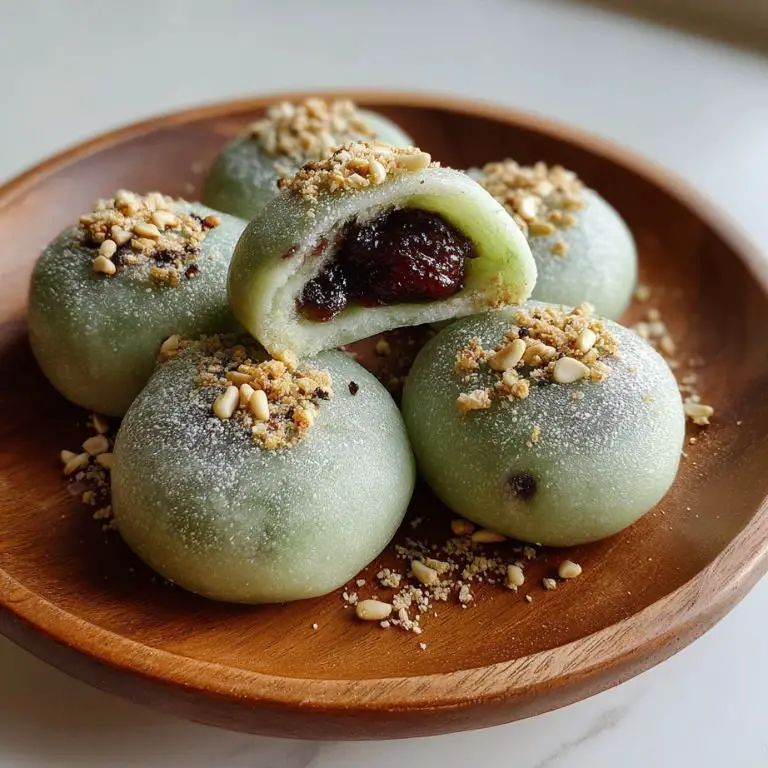Mugwort Korean rice cake with sweet red bean filling is a dish that feels like a hug from home. Known in Korea as ssuk-beomul tteok, this delicate treat blends the earthy flavor of mugwort with the chewy texture of sticky rice cakes and the creamy sweetness of red bean paste. It’s a dessert that feels both nostalgic and fresh, deeply rooted in Korean cooking traditions but surprisingly easy to recreate in your own kitchen. Whether you're diving into Korean baking for the first time or looking to expand your healthy dinner recipes with something subtly sweet and satisfying, this mugwort rice cake delivers.
Mugwort Korean Rice Cake with Sweet Red Bean Filling
Prep Time 30 minutes mins
Cook Time 20 minutes mins
Total Time 50 minutes mins
Course Dessert, Snack
Cuisine Korean
Steamer Basket or Bamboo Steamer Essential for steaming the rice cakes. If you don’t have one, a metal colander over a pot of boiling water with a lid works in a pinch.
Mixing bowl For combining the rice flour and mugwort mixture.
Silicone Mat or Clean Work Surface To knead and shape the dough.
Small Scoop or Spoon To portion the red bean paste.
Parchment Paper or Cheesecloth Line the steamer to prevent sticking.
Measuring cups and spoons Precision matters when working with rice flour.
For the Rice Cake Dough
- 2 cups sweet rice flour also known as glutinous rice flour or mochiko
- 1 tablespoon mugwort powder or ½ cup fresh mugwort, blanched and finely chopped
- ½ teaspoon salt
- 2 tablespoons sugar optional, for a slightly sweet dough
- ¾ to 1 cup warm water adjust as needed
For the Filling
- 1 cup sweetened red bean paste store-bought or homemade
To Prevent Sticking
- ½ cup roasted soybean flour kinako or extra rice flour for dusting
Optional Garnishes
- Crushed toasted sesame seeds
- Chopped nuts like peanuts or pine nuts
Step 1: Prepare the Steamer
Set up your steamer by bringing a few inches of water to a boil. Line the steamer tray with parchment paper or a damp cheesecloth to prevent the rice cakes from sticking.
Step 2: Make the Dough
In a large mixing bowl, combine sweet rice flour, mugwort powder (or blanched mugwort), salt, and sugar. Gradually add warm water while stirring continuously until a soft dough forms. The dough should be pliable but not sticky.
If you’re using fresh mugwort, make sure to blanch it in boiling water for about 1 minute, then rinse in cold water and squeeze out the moisture. Chop it finely before adding to the flour.
Step 3: Divide and Flatten
Divide the dough into 8 equal portions. Dust your hands and surface with rice flour to prevent sticking. Flatten each piece into a small disc about 3 inches in diameter.
Step 4: Add the Filling
Scoop about 1 tablespoon of red bean paste into the center of each disc. Gently pinch the edges together to seal the filling, then roll lightly in your palms to form a smooth ball.
Step 5: Steam the Rice Cakes
Place the filled rice cakes into the steamer, leaving space between them. Steam over medium-high heat for about 20 minutes. The rice cakes should become slightly translucent and very soft to the touch.
Step 6: Cool and Finish
Once steamed, remove the rice cakes and allow them to cool slightly before handling. Dust them with roasted soybean flour or rice flour to keep them from sticking and to add a subtle nutty aroma.
Pairings
This dish is traditionally enjoyed on its own or with light accompaniments, but here are a few ideas to round out your experience:
- Green Tea or Roasted Barley Tea: The earthy bitterness of tea balances the sweetness of the red bean paste perfectly.
- Fresh Fruit Slices: Pears, apples, or Korean melons bring a crisp freshness to contrast the chewy texture.
- Savory Side Dish: A small bowl of kimchi or pickled radish can cut through the richness and offer a playful sweet-sour contrast—great for those seeking korean dishes that balance flavors.
- Modern Fusion: Serve with a drizzle of warm gochujang sauce for a spicy-sweet twist that blends savory korean cooking with traditional dessert textures.
FAQs
1. Can I use regular rice flour instead of sweet rice flour?
No, for this recipe, sweet rice flour (glutinous rice flour) is essential to achieve the chewy texture typical of sticky rice cakes. Regular rice flour will result in a crumbly dough that doesn’t hold up well.
2. What type of red bean paste should I use?
You can use smooth (koshi-an) or chunky (tsubu-an) sweet red bean paste. If making it from scratch, cook adzuki beans with sugar and a pinch of salt until soft, then mash or puree.
3. Can I freeze these rice cakes?
Yes, mugwort rice cakes freeze well. Wrap each one in plastic wrap and place in an airtight container. Steam or microwave to reheat. This makes them a great option for quick lunch recipes or easy food recipes you can prep ahead.
4. Is there a substitute for mugwort?
If mugwort is hard to find, you can use matcha powder or spinach puree for a green hue and mild flavor. However, nothing quite replicates the herbal note of mugwort in traditional korean desserts.
5. Can I bake these instead of steaming?
Steaming is preferred for rice flour recipes like this one. Baking tends to dry out the dough, and you’ll lose the signature chewy softness found in steamed rice cake. Stick with steaming for the best texture.
